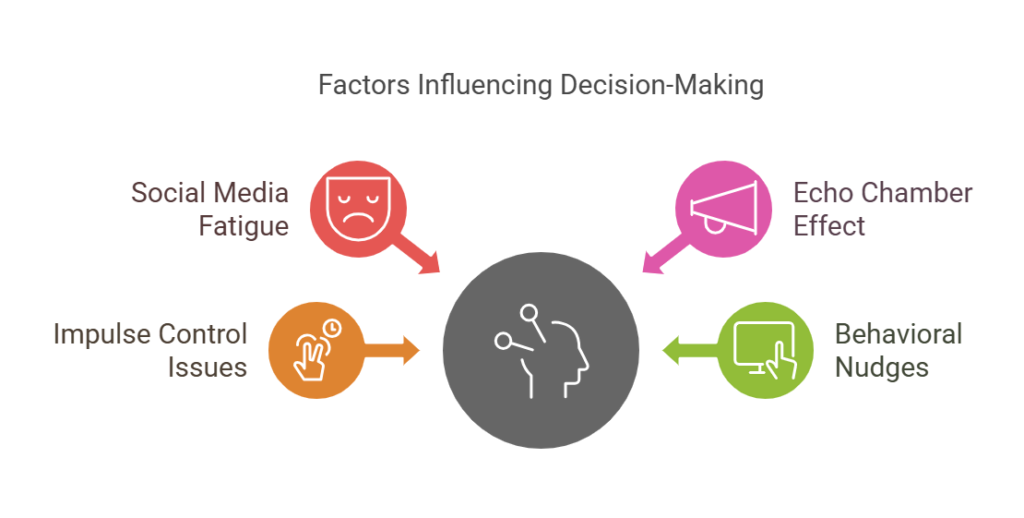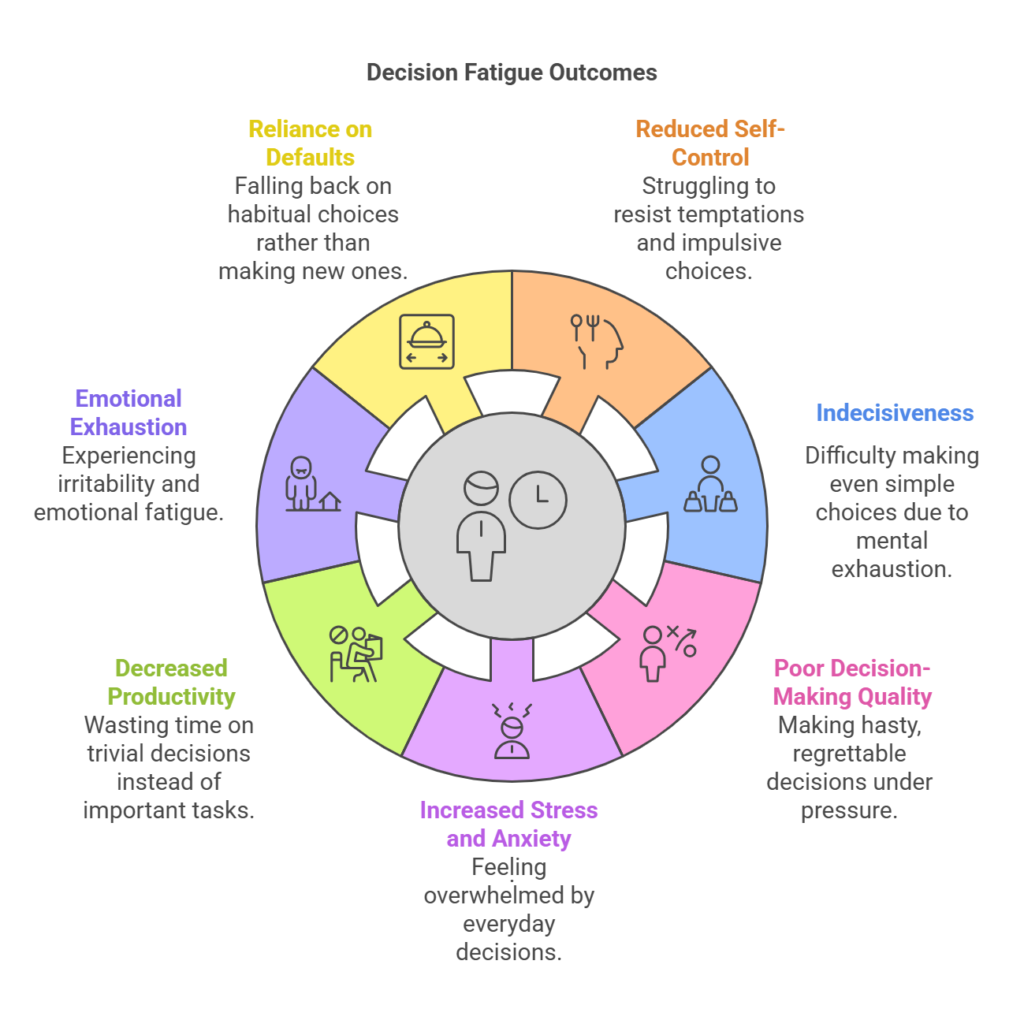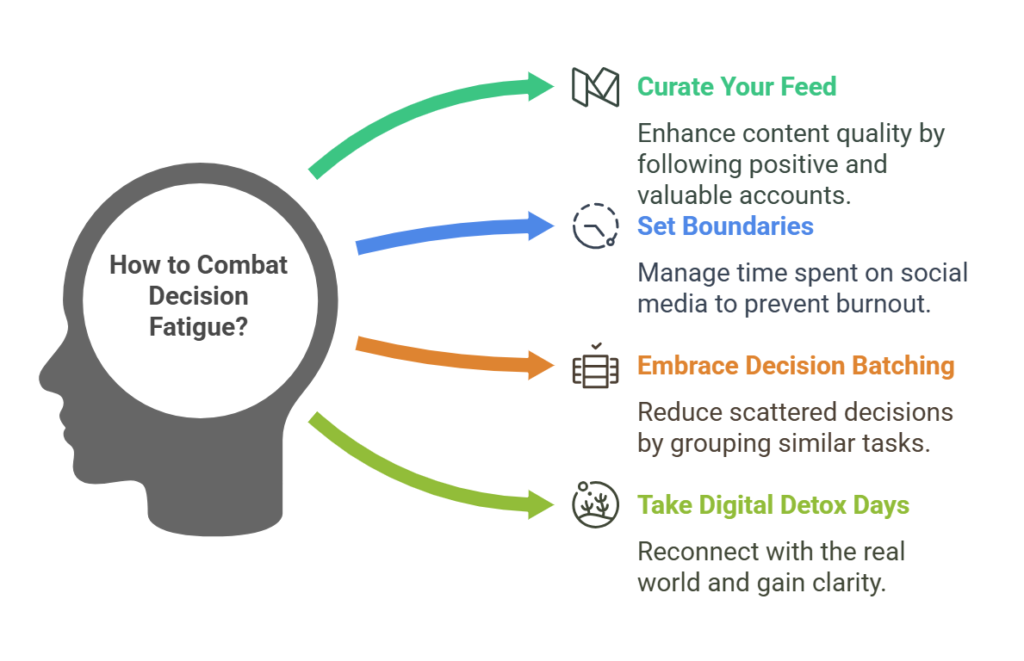Social media scrolling is like eating chips—you tell yourself you’ll stop after one, but suddenly the bag’s empty, and you’re wondering where all your time went. It’s not just the time drain, though; it’s the mental exhaustion that creeps up on you, leaving you oddly tired after what seemed like a mindless activity. Enter the not-so-silent culprits: social media algorithms.
Algorithms, those sneaky little codes working behind the scenes, aren’t just curating your feed. They’re slyly nudging you into a whirlwind of micro-decisions—should I like this post? Do I comment on that meme? Is this influencer worth following? And before you know it, you’re drowning in decision fatigue. Let’s unravel how this works and what you can do to reclaim your peace of mind (and your sanity).
Decision Fatigue: The Quiet Mental Exhaustion
Think of your brain as a battery. Every choice you make, big or small, drains it a little. Decision fatigue happens when your mental battery is so low that even deciding what to eat for dinner feels like solving a Rubik’s cube. Social media, with its barrage of endless options, doesn’t just drain this battery—it fast-tracks you to “low power mode” without you even noticing.
Now, add algorithms into the mix. These aren’t just tech marvels—they’re master manipulators, feeding you content designed to keep you hooked. But all that curated content requires constant decisions: Should I scroll, share, or just move on? Multiply that by a few dozen posts, and you’re left wondering why you’re so drained.
The Role of Algorithms in Decision Fatigue

1. The Never-Ending Feed
Social media is a buffet without a closing time. Whether it’s TikTok’s For You Page or Instagram’s infinite scroll, there’s no natural stopping point. You think, Just one more post, but there’s always another. Algorithms deliberately remove the “last page” so you stay engaged—and the more you scroll, the more decisions you make.
Impact: It’s like playing an endless game of mental tug-of-war. Every swipe taxes your mind a little more, leaving you too frazzled to make important decisions later, like whether to do the dishes or just order takeout (again).
2. The Viral Cliffhanger
Have you ever watched a reel and thought, I just need to see the ending, only to realize you’ve been duped into watching a series of “part 2” videos? That’s algorithm gold right there. Platforms dangle the carrot of curiosity just out of reach, keeping you hooked and hesitant to put the phone down.
Impact: These mini-cliffhangers create a sense of urgency, tricking your brain into staying engaged. By the time you’re done, you’re not just out of time—you’re out of patience and energy, too.
3. Personalization Paralysis
Here’s the irony: algorithms know you so well that they overwhelm you. They curate content so tailored to your preferences that you feel compelled to engage. But when everything seems relevant, it’s harder to decide what deserves your attention.
Impact: Instead of feeling entertained, you’re left in a state of low-key panic, juggling likes, comments, and shares like it’s a high-stakes game show.
4. Notification Overload
Let’s not forget the digital equivalent of someone tapping your shoulder every five minutes—notifications. Each ping demands a decision: Should I check now or later? Respond or ignore? And heaven forbid you get a notification about an urgent update you didn’t ask for.
Impact: These constant interruptions keep your brain in decision-making mode, even when you’re off the app. It’s like being on-call for a job you didn’t apply for.
How Social Media Algorithms Shape Our Decisions: Key Study Insights

Algorithms are like your overenthusiastic friend who keeps guessing what you want—but they don’t always get it right. These sneaky little bits of code decide what you see on your feed, prioritizing stuff that’ll keep you hooked. But here’s the kicker: all this curated content can actually mess with how we think and make decisions.
What’s the Deal With Decision Fatigue?
Ever feel totally drained after scrolling through endless posts, reels, and stories? That’s social media fatigue kicking in. One study (UNFRIEND ME, PLEASE) found that algorithms bombard us with so much content, our brains just can’t keep up. The overload makes it harder to think straight, let alone make good choices.
It’s like trying to decide what to eat when you’ve got 100 options—you end up grabbing junk because your brain’s too tired to process it all.
The Echo Chamber Effect
Here’s another curveball: algorithms love showing you stuff you already agree with. Why? Because it keeps you clicking and scrolling. But when you’re only seeing one side of the story, it’s easy to start thinking that’s the whole truth. A study (Too Much Facebook?) showed that this “echo chamber” effect limits your perspective and influences your choices—whether it’s what to buy, how to vote, or even who to trust.
Imagine always eating pizza because it’s what’s in your fridge. Delicious, sure—but you’re missing out on sushi, tacos, or that amazing local ramen spot.
How Algorithms Push Our Buttons (Literally)
Ever feel like you’re making impulsive decisions online? Like buying something because it’s “on sale for 24 hours” or reacting to a post without thinking? Algorithms are designed to nudge you like that. They use notifications, recommendations, and trending content to trigger instant reactions.
A study (Dergipark) found that these constant nudges mess with our impulse control. Instead of pausing to think, we go for the quick win—whether that’s adding something to our cart or clicking “like” on a viral post. It’s like being at a buffet with a waiter constantly handing you desserts—you’re full, but you keep eating.
Behavioral Nudges and the Power of Suggestions
Algorithms are pretty sneaky. They rank posts, ads, and news articles based on what’s likely to grab your attention. A study (ScienceDirect) found that this can quietly steer our behavior. Think about it: ever bought something because it kept popping up in your feed? Or read an article because it was the first one you saw? That’s not coincidence—that’s an algorithm working its magic.
The Psychological Effects of Decision Fatigue
Let’s face it, life’s a constant juggling act of decisions—big ones, like whether to switch jobs, and tiny ones, like whether to have oat milk or almond milk in your latte. But have you ever noticed how, by the end of the day, even the smallest choices feel like monumental tasks? That’s decision fatigue for you, a sneaky culprit that leaves you mentally drained and, sometimes, stuck in a spiral of poor choices.

Decision fatigue is like running out of battery on your mental smartphone. Each decision you make throughout the day chips away at your mental charge, and when it hits 1%, your brain throws its hands up and says, “That’s it, I’m done!” Let’s unpack how this happens and why it messes with everything from your productivity to your emotional sanity.
1. Reduced Self-Control and Impulse Control
Ever told yourself, “I’ll eat healthy today,” only to find yourself demolishing a family-sized bag of chips at 9 PM? That’s not a lack of discipline—it’s your brain waving a white flag. Decision fatigue saps your self-control, leaving you vulnerable to cravings, distractions, and impulse buys you’ll regret later.
- Relatable Moment: After a long day of meetings, you’re in the grocery store trying to buy just eggs but end up with three tubs of ice cream and a box of cookies. Why? Your brain ran out of juice to argue with itself.
- The Why Behind It: Self-control and decision-making pull from the same pool of mental energy. When you’ve drained that pool dry, your inner voice of reason gets quieter—like the friend who’s usually the designated driver but decides, “Not my problem tonight.”
2. Indecisiveness and Avoidance
You know that paralyzing feeling of standing in front of a Netflix menu, unable to pick a movie? That’s decision fatigue laughing in your face. As your mental reserves dwindle, even low-stakes choices feel like Herculean tasks.
- Example: You’re online shopping for a new backpack. Five tabs and two hours later, you still haven’t clicked “add to cart” because… what if the other one is better?
- How It Feels: Exhausting. You’re not lazy or indecisive; your brain is just tired of holding the reins. It’s like asking a marathon runner to sprint one more mile—they’re going to flop.
3. Poor Decision-Making Quality
When decision fatigue sets in, your brain gets into “whatever, just pick something” mode. The result? You end up making snap decisions that you might regret, all because weighing options feels impossible.
- Real-Life Scenario: Your team’s depending on you to pick a project direction, but after hours of deliberation, you just blurt out the first thing that comes to mind. Later, you’re left wondering, “Why on earth did I suggest that?”
- Why It Happens: Your brain prioritizes speed over accuracy when it’s worn out. It’s like when you’ve been walking around IKEA for three hours and grab the first lamp you see just to leave the store.
4. Increased Stress and Anxiety
There’s a sneaky link between decision fatigue and stress. The more drained you are, the more overwhelming even basic choices feel. Your brain can’t differentiate between “What should I have for lunch?” and “Should I take this life-altering job?”
- Example: You’re supposed to decide where to go for dinner, and suddenly it feels like the weight of the world is on your shoulders. Your partner asks, “Thai or sushi?” and you respond with an existential sigh, “I don’t care, you choose!”
- The Fallout: Stress compounds quickly. When your brain is fried, every decision adds a little more fuel to the anxiety fire, leaving you frazzled and out of sorts.
5. Decreased Productivity
Have you ever sat down to tackle a big project, only to realize you’ve spent the last 20 minutes debating which font to use for your presentation? That’s decision fatigue sneakily zapping your productivity.
- Example: By the time you’ve chosen the perfect font (spoiler: it’s usually Helvetica), your energy for the actual task is gone. You’ve wasted your decision-making reserves on the trivial, leaving nothing for the important stuff.
- Pro Tip: Limit the number of low-stakes decisions you make daily. Save your mental energy for the things that actually move the needle.
6. Emotional Exhaustion
Decision fatigue doesn’t just mess with your productivity—it toys with your emotions, too. By the end of a decision-packed day, you might find yourself snapping at loved ones over minor things. It’s not that you’re a bad person; your emotional bandwidth is simply spent.
- Example: You’re juggling work emails, dinner plans, and a leaking faucet. Then your roommate asks if they can borrow your charger, and suddenly you’re yelling, “Why don’t you ever buy your own stuff?!”
- Why It Hurts: Emotional exhaustion is a sidekick to decision fatigue, and it can strain relationships, fuel guilt, and leave you feeling like you’re constantly on edge.
7. Reliance on Defaults and Habits
When your decision-making capacity is tapped out, you tend to fall back on familiar habits or defaults, even if they’re not the best choices. It’s why you might skip the gym and watch a rerun of Friends for the 10th time instead of trying that new yoga class.
- Example: You promised yourself you’d cook a healthy dinner, but the idea of chopping vegetables feels like climbing Everest. Instead, you grab takeout from the place you’ve been to three times this week.
- The Pattern: Over time, this reliance on defaults can hinder personal growth. You’re not making intentional choices—you’re just coasting.
How to Fight Back Against Decision Fatigue
Here’s the good news: you don’t have to be a passive victim of algorithmic trickery. With a few mindful tweaks, you can reclaim your brainpower and turn social media into a tool instead of a trap.

1. Curate Your Feed Ruthlessly
Follow accounts that add value to your life—whether they inspire, educate, or simply make you laugh. Unfollow or mute anyone who brings negativity or unnecessary clutter. Here a secret tip “Treat your feed like your closet during spring cleaning. If it doesn’t bring you joy (or useful content), it’s time to let it go.”
2. Set Boundaries
Social media thrives on your time, but you don’t owe it endless hours. Set time limits or schedule specific windows for scrolling. For example use your morning coffee break or post-dinner downtime to check your feed, and stick to those moments. Your brain will thank you.
3. Embrace Decision Batching
Instead of deciding in real-time, batch similar tasks. For example, save posts you want to engage with and review them all at once, instead of scattering micro-decisions throughout the day. Batching reduces the mental load, leaving you with more energy for important choices—like what to binge-watch tonight.
4. Take Digital Detox Days
Sometimes the best way to fight decision fatigue is to unplug entirely. Set aside one day a week to go screen-free and reconnect with the real world. You’ll be amazed at how much clarity and energy you gain when you’re not glued to your phone.
5. Automate the Small Stuff
Save your brainpower for the big decisions by automating or simplifying the small ones. Steve Jobs wore the same outfit every day—so do many high performers—because it’s one less thing to think about.
Tip: Plan your meals, outfits, or workouts for the week ahead. Your future self will thank you.
6. Automate the Small Stuff
Decision fatigue is part of being human. If you find yourself making less-than-stellar choices, cut yourself some slack. Tomorrow is a fresh start.
The Bigger Picture: How Algorithms Influence Society
It’s not just individual users who are affected. Decision fatigue shapes broader societal trends, from polarized debates to impulsive shopping sprees. Algorithms prioritize engagement over accuracy or nuance, creating a culture of reaction rather than reflection.
Current Example: Think of the recent viral debates over AI art or fast fashion. These discussions often devolve into extremes, fueled by algorithms that amplify controversy and limit middle-ground perspectives.
Reimagining Social Media for Mental Wellness
The future of social media doesn’t have to be a mental drain. Platforms are experimenting with features like time reminders and wellness prompts, signaling a shift toward healthier engagement. But true change starts with us, the users.
Final Thoughts: Take Back Control
Social media algorithms are clever, but they’re not invincible. By understanding how they work and making intentional choices, you can reduce decision fatigue and take back control of your mental energy.
Next time you’re scrolling, ask yourself: Am I choosing this, or is the algorithm choosing for me? A simple pause can make all the difference. After all, your brain deserves better than to be on-call for a digital assistant that never sleeps.
Image Source- pexels
List of the studies and research sources
- UNFRIEND ME, PLEASE: Social Media Fatigue and the Theory of Rational Choice
ResearchGate Link - Social Media Algorithms and Decision-Making
ScienceDirect Link - Too Much Facebook: An Exploratory Examination of Social Media Fatigue
ResearchGate Link - The Influence of Algorithms on Consumer Decision-Making
Journal Article on Sage - Behavioral Nudges Through Social Media Algorithms
Dergipark Journal (Specific title and access link pending due to the general reference). - Algorithms and Decision Fatigue
Honors Thesis – Penn State University (Title: Impacts of Social Media Algorithms on Decision-Making).
PDF Link







